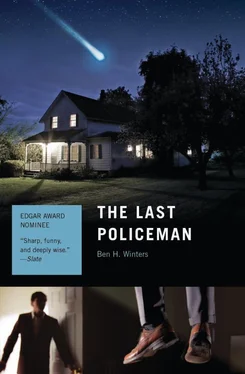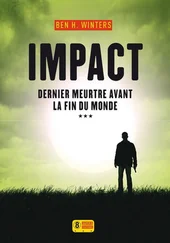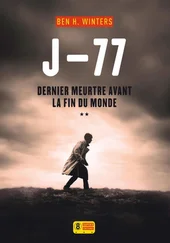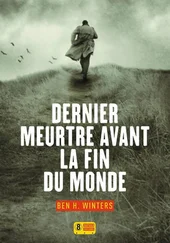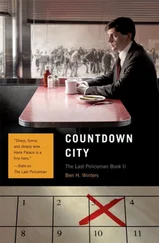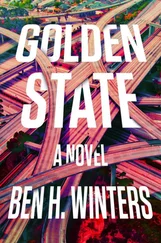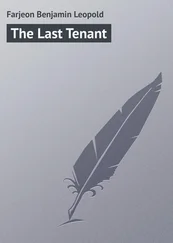“Guys, as of this morning, the Concord Police Department has been federalized.”
Nobody says anything. Ordler’s got a binder under his right arm, the seal of the Justice Department stamped on the side.
“Federalized? What does that mean?” I ask.
Culverson shakes his head, slowly gets up, lays a steadying hand on my shoulder. McGully stays where he is, tugs out a fresh cigarette and lights it.
“What does that mean?” I ask again. Ordler looks at the floor, keeps talking.
“They’re overhauling everything, putting even more kids on the street, and they say I can keep most of my patrol officers, if I want and they want, but all under Justice Department jurisdiction.”
“But what does it mean ?” I ask a third time, meaning, for us? What does it mean for us? The answer is obvious. I’m standing in an empty room.
“They’re shutting down the investigative units. Basically—”
I shake Culverson’s hand off my shoulder, drop my face down into my hands, look up again at Chief Ordler, shaking my head.
“—basically the feeling is that an investigative force is relatively unnecessary, given the current environment.”
He goes on for a while—it all gets lost for me, after that, but he goes on—and then at some point he stops talking and asks if there are any questions. We just look at him, and he mumbles something else, and then he turns and leaves.
I notice for the first time that our radiator has been shut off, and the room is cold.
“They know,” Culverson says again, and we both pivot our heads toward him, like marionettes.
“They’re not supposed to know for more than a week yet,” I say. “April 9, I thought.”
He shakes his head. “Somebody knows early.”
“What?” says McGully, and Culverson says, “Somebody knows where the damn thing is going to come down.”
* * *
I open the front shotgun-seat door of the Impala, and McConnell says, “Hey. What’s the story?” and I don’t say anything for a long time, I just stand there with one hand on the roof of the car, looking in at her, craning my neck to look at the prisoner in the backseat, slouched down, staring up. Michelson is sitting on the hood, smoking a butt, like my sister did that day in the parking lot.
“Henry? What’s going on?”
“Nothing,” I say. “Nothing. Let’s go ahead and take him in.”
McConnell and Michelson and I remove the suspect from the backseat and stand him up in the garage. There’s a little crowd watching us, Brush Cuts and a few of the vets, Halburton, the old mechanic who’s still kicking around the garage. We pull Littlejohn from the car in his handcuffs, in his sharp leather jacket. A concrete stairwell leads from this area directly down to the basement, to Booking, to be used in exactly this circumstance: the perp is brought in, in a squad car, and handed directly to the duty officers to be taken down for processing.
“Stretch?” says Michelson. “What’s up?”
I’m just standing there, one hand on the suspect’s arm. Someone wolf-whistles at McConnell, she’s still in the skirt and blouse, and she says, “Up yours.”
I’ve used the staircase for pickpockets, once for a suspected arsonist, for countless drunks. Never before for a murderer.
A double-murderer.
I feel nothing, though, I feel numb. My mother would have been proud of me, I think dumbly; Naomi might have been proud of me. Neither is here. In six months none of this will be here, this’ll be ash and a hole.
I start moving again, leading the little group in step toward the staircase. The detective brings in his man. My head hurts.
What happens next, under normal circumstances, is this: The on-duty processing officers take custody of the suspect and walk him down the steps to the basement, where the suspect is fingerprinted and reminded of his rights. Then he would be searched, photographed, the contents of his pockets collected and labeled. His options for legal counsel would be presented to him; someone like Erik Littlejohn, a man of means, would presumably have private counsel he could retain, and he would be afforded an opportunity to make those arrangements.
This top step of this concrete staircase, in other words, is in fact just the next step in a long and complicated journey that begins with the discovery of a corpse on a dirty bathroom floor and ends ultimately at justice. That’s under normal circumstances.
We’re lingering a few steps from the stairhead, Michelson says it again, “Stretch?” and McConnell says, “Palace?”
I don’t know what happens to Littlejohn once I give him over to the two kids, maybe seventeen, eighteen years old, who are waiting with their dull eyes and their hands outstretched to guide my suspect down the stairs.
The due-process rules have been adjusted several times under IPSS and the corresponding state laws, and the truth is I don’t know what’s in the new statutes. What’s in the binder Chief Ordler was holding just now—what other provisions are included along with the suspension of detective-level criminal investigation?
I haven’t confronted the question, in my heart, of what happens next to the alleged murderer once he’s been brought in. Tell you the God’s honest truth, I don’t think I ever believed I’d be standing here.
But now—I mean—what’re the options? That is the question.
I’m looking at Erik Littlejohn, and he’s looking at me, and then I say, “I’m sorry,” and I hand him over.

I’m rolling on a ten-speed bicycle down the sun-washed sidewalks of New Castle, New Hampshire, in search of Salamander Street. The sun is up there slipping in and out of patchy cloud cover, the breeze is warm and kind and salt-smelling, and I decide, what the heck, and I take a right and coast down a side street toward the water.
New Castle is a small and charming summer town out of season, with the chained-up souvenir shops, the ice-cream-and-fudge place, the post office, the historical society. There’s even a boardwalk, running for a quarter mile or so along the beach, a handful of happy beachgoers out on the dunes. An elderly couple hand in hand, a mom tossing a Nerf football with her son, a teenager sprinting, trying to get a bulky box kite up and off the ground.
A path from the far end of the beach leads back to the town square, where a green lawn surrounds a handsome dark-wood gazebo festooned with bunting and American flags. It looks like there was a small-town celebration last night, and it looks like there’s going to be another one tonight. A couple of locals are wandering into the square, even now, unpacking brass instruments and making small talk, shaking hands. I chain up my ten-speed bike by an overflowing garbage can surrounded by paper plates, uneaten bites of funnel cake drawing happy lines of ants.
There was a parade in Concord last night, also, and there were even fireworks launched from a barge in the Merrimack, bursting majestically and sparkling around the golden dome of the state house. Maia, we now know, is going to land in Indonesia. They can’t or won’t name an impact spot with a hundred percent certainty, but the vicinity is the Indonesian archipelago, just east of the Gulf of Boni. Pakistan, with its eastern border just four thousand kilometers from the impact site, has renewed its promise to blast the rock from the sky, and the United States has renewed its objections.
In America, meanwhile, across the country, parades and fireworks and celebrations. And, at a suburban shopping mall outside Dallas, looting, followed by gunfire, ending in a riot; six people dead. A similar incident in Jacksonville, Florida, and one in Richmond, Indiana. Nineteen people dead at a Home Depot in Green Bay, Wisconsin.
Читать дальше
